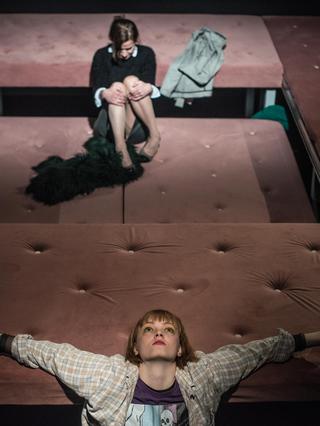 How to get to us
How to get to us
MeetFactory, o. p. s.
Ke Sklárně 3213/15
150 00 Praha 5
GPS:
50.053653
14.408441
Opening hours:
13:00 to 20:00 + based on evening program
Our Repertoire
Marie Pourchet: Fire
Dramatisation of last year's Czech translation of a brilliant novel by a contemporary French author. A scorching relationship drama set against the backdrop of a covida pandemic, it uses fascinating language to open up the complicated current themes of intergenerational clashes, culture wars and the psychological consequences of quarantine isolation. Above all, however, it provides a riveting study of the two main characters and their neurotic and in every conceivable way toxic relationship. An urgent and most contemporary account of how numbed desire is not enough for sexual gratification, nor is finding your way to another person.
Matěj Samec: Breath
Joseph is called Joseph, but no one calls him by his name. When he was little, he believed the stars got a little closer every night. He clears his head with strenuous mountain treks, has a favorite bar where an interesting singer often sings sad songs about the hints of love. His personal life is in tatters, he cheats on his wife with women from the internet in filthy hotel rooms.
The rain has come down from the sky, silent as a corpse.
For the most part, the production, like all the more interesting events of our sad lives, takes place in the dark to allow the essential sensory sensations to emerge; the high pitched tone of the nervous system, the deep tone of the rushing blood, and the dynamically changing rhythm of human breathing, determined by the actual intensity of the panic of our mothers' deaths.
Annie Ernaux: A Woman´s Story
How do we move in the space of our memory? How does the process of remembering work at all? An archaeology of images, gestures and everyday sentences. From individual fragments, Annie Ernaux, in A Woman's Story, pieces together the life of her mother, who came from a poor working-class background in the town of Yvetot. A ritual against the fading of memory. Through precise, evocative language, the French writer explores her relationship to a world from which she has gradually alienated herself through her education and way of life.
Julian Barnes: The Noise of Time
A literary adaptation of a fictitious biography of Dmitri Shostakovich who spent almost all his life in Soviet Russia. He was persecuted during Stalin’s regime because his formalist music did not meet the state propaganda requirements. After exposure to Stalin’s cult of personality, he was pushed to cooperate with the state power.
What are the options of a person fundamentally believing in their talent but facing inhuman and morally corrupted conditions of their time if they want to survive, create, and also save their face, at least before themselves? What is the meaning of creating art in a society where the truth cannot be said out loud? How much do they struggle against their own conscience, and could this struggle be ever won?
These are the questions that cross our minds not only when we study the life and work of the world-famous composer, but also in relation to ourselves.
Michel Houellebecq: Serotonin
Serotonin is a neurotransmitter stored in blood platelets, and when it is lacking, depression and mood disorders ensue. Serotonin is also the title of a most gloomy book by the French writer Michel Houellebecq, whose first theatrical staging in the Czech context will take place at the MeetFactory Theater.
Forty-six-year-old Florent-Claude, physically healthy, but just on the edge of death, discovers that he has made a mistake in his life: he has somehow missed the fact that being in a romantic relationship places different demands on a person than choosing hummus in the supermarket. He experiences an overwhelming sense of emptiness, which cannot be driven away by tactics that were previously successful, such as luxury goods, narcotics, exotic destinations and perverted sex. From one day to the next, Florent-Claude cuts all of his work and personal ties and abandons all of the practical components of his daily life. He stages several real and phantasmagoric encounters with his previous partners and with himself, so that he can fully dedicate himself to his loneliness and stumble onto an inescapable conclusion. The pain he experiences is threatening, but it seems to be inevitable, and cleansing.
Tomáš Loužný: Ecstasy
Swimming Pool, Barrandov Terraces
She was regarded as one of the biggest stars of the silver screen and was called the most beautiful woman in the world. She's a precursor to Disney's Snow White. She was also very clever, interested in technology and is credited by many with a number of scientific inventions, including the technology that became the basis for Wi-Fi, Bluetooth and GPS. She is also said to have invented, for example, the tissue box. She has succeeded six husbands, earned and spent huge amounts of money, tried her hand at being a film producer, and loved to make phone calls, sometimes reportedly for up to 18 hours a day. The Barrandov Terraces swimming pool is the backdrop for Gustav Machatý's experimental film Extase (1932), where Hedy Lamarr's stellar career took off after she became the first person in history to appear naked in a film, causing a worldwide scandal. She lived the last 35 years of her life in seclusion, sad and lonely.







